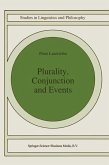Structuring Events presents a novel semantic theory of lexical aspect for anyone interested in the study of verb meanings.
- Provides an introduction to aspectual classes and aspectual distinctions.
- Utilizes case studies to present a novel semantic theory of lexical aspect and compare it with alternative theories.
- Useful for students and scholars in semantics and syntax as well as the neighboring fields of pragmatics and philosophy of language.
Dieser Download kann aus rechtlichen Gründen nur mit Rechnungsadresse in D ausgeliefert werden.
"This is the most important book on lexical aspect since DavidDowty's seminal Word Meaning and Montague Grammar."Angelika Kratzer, University of Massachusetts-Amherst
"As well as providing a clear introduction to the subject, thisexcellent book extends our knowledge of the lexical aspectualproperties of verbs and verb phrases in new and originaldirections. Rothstein's careful exploitation of the flexibility ofevent-based semantics in providing a solid foundation for theinterpretation of verbal aspect establishes the theory as centralto any explanation of this often difficult - but everfascinating - topic." Ronnie Cann, University ofEdinburgh
"This outstanding book represents a new breakthrough in thegeneral theory of lexical aspect. The discussions of the previousresearch are distinguished by clarity as well as new challenges andinsights. In a highly engaging way Rothstein also advances newsolutions to some of the most thorny issues - includingaspectual shifts, progressive achievements, and resultativepredication - which will shape the future research in lexicalaspect." Hana Filip, Stanford University
"Rothstein's book contains many observations, deepintuitions and exciting analyses which will doubtless be veryinfluential in a variety of areas. Empirically, the book contains atreasure trove of interesting data that will no doubt be mulledover for years to come." Lingua
"As well as providing a clear introduction to the subject, thisexcellent book extends our knowledge of the lexical aspectualproperties of verbs and verb phrases in new and originaldirections. Rothstein's careful exploitation of the flexibility ofevent-based semantics in providing a solid foundation for theinterpretation of verbal aspect establishes the theory as centralto any explanation of this often difficult - but everfascinating - topic." Ronnie Cann, University ofEdinburgh
"This outstanding book represents a new breakthrough in thegeneral theory of lexical aspect. The discussions of the previousresearch are distinguished by clarity as well as new challenges andinsights. In a highly engaging way Rothstein also advances newsolutions to some of the most thorny issues - includingaspectual shifts, progressive achievements, and resultativepredication - which will shape the future research in lexicalaspect." Hana Filip, Stanford University
"Rothstein's book contains many observations, deepintuitions and exciting analyses which will doubtless be veryinfluential in a variety of areas. Empirically, the book contains atreasure trove of interesting data that will no doubt be mulledover for years to come." Lingua









